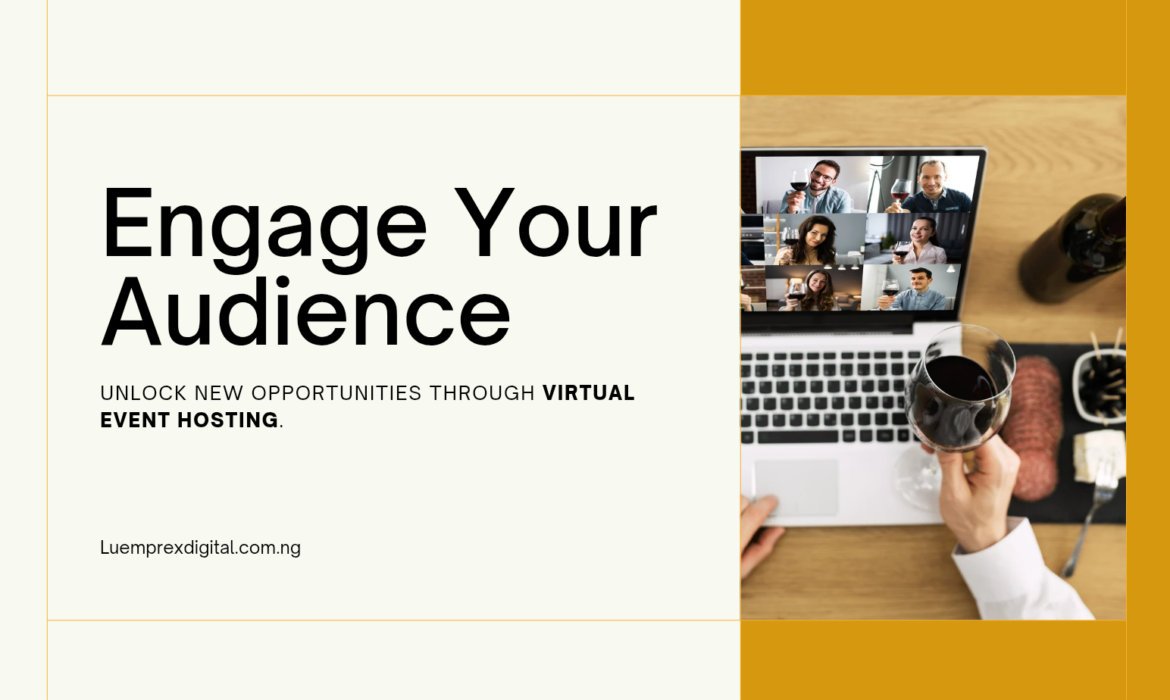081-4797-7173
In today’s digitally connected world, virtual events have become a game changing tool for businesses. As more brands look for innovative ways to connect with their audiences, virtual events stand out for their ability to foster engagement, enhance reach, and create memorable experiences.
Whether it’s webinars, online conferences, product launches, or virtual trade shows, these events offer numerous benefits for businesses aiming to grow their brand presence and build stronger relationships with their audience. This blog post explores the advantages of hosting virtual events for brand engagement and provides insights into how they can elevate your marketing strategy.
1. Increased Accessibility and Reach
One of the primary benefits of virtual events is their ability to eliminate geographical barriers. Unlike in person events that are often limited to local attendees, virtual events can attract a global audience.
Why it matters:
- Anyone with an internet connection can join, making it easier to engage with a diverse audience.
- Your brand can reach potential customers in regions where it might not have a physical presence.
Example:
A SaaS company hosting a global webinar can attract attendees from different time zones, showcasing its expertise and expanding its customer base.
2. Cost-Effectiveness
Virtual events are significantly more cost effective than physical ones. Hosting a live event involves expenses such as venue rental, catering, travel, and accommodation for speakers and attendees.
Benefits for brands:
- Save on logistical costs.
- Allocate resources to enhance the virtual experience, such as high quality content and interactive tools.
Example:
An ecommerce brand can launch a new product through a virtual event, saving costs while still creating buzz and reaching a large audience.
3. Enhanced Brand Visibility
Virtual events provide an excellent platform to showcase your brand’s expertise and values. By hosting well structured events, you can position your brand as a thought leader in your industry.
How it works:
- Use branded visuals, logos, and messaging throughout the event.
- Share valuable content that aligns with your brand’s mission and expertise.
Example:
A fitness brand hosting virtual workout sessions or wellness webinars not only engages its audience but also reinforces its position as an authority in the industry.
4. Data Collection and Insights
One of the standout advantages of virtual events is their ability to collect detailed attendee data. With advanced analytics tools, brands can gain insights into audience behavior, preferences, and engagement levels.
Key metrics to track:
- Attendance rates.
- Duration of engagement.
- Questions asked during Q&A sessions.
- Downloads of shared resources.
How it helps:
Refine future marketing strategies.Personalize follow up communication.Identify high potential leads.
Example:
A B2B company hosting a virtual trade show can analyze which booths were most visited and tailor their outreach accordingly.
5. Improved Audience Engagement
Virtual events are packed with interactive features that encourage participation and engagement, such as:
- Live polls and surveys.
- Chat features for real time interaction.
- Gamification elements like quizzes and leaderboards.
- Breakout rooms for smaller group discussions.
Benefits for brands:
- Keeps the audience actively involved.
- Provides instant feedback on audience preferences.
Example:
A fashion brand hosting a virtual styling session can use live polls to let attendees vote on their favorite looks, fostering interaction and excitement.
6. Flexibility and Convenience
Virtual events offer unmatched convenience for both hosts and attendees.
Attendees can join from anywhere, avoiding travel and time constraints.
Hosts can easily adapt the format and schedule to fit their needs.
Why it works:
- Busy professionals are more likely to attend if the event is accessible and time efficient.
- Record sessions for on demand viewing, allowing audiences to engage at their convenience.
Example:
An educational institution hosting virtual open days can attract more prospective students by offering flexible viewing options.
7. Sustainability and Eco-Friendliness
With growing awareness about environmental impact, virtual events align with sustainable practices by reducing carbon footprints associated with travel and physical event logistics.
How it supports brands:
- Demonstrates your commitment to sustainability.
- Resonates with eco conscious audiences.
Example:
A tech company promoting its green initiatives can enhance credibility by hosting environmentally friendly virtual events.
8. Easy Scalability
Virtual events are easily scalable, accommodating varying audience sizes without significant logistical challenges.
Benefits:
- Start small and expand as your audience grows.
- Add features like multi language support or additional sessions for larger audiences.
Example:
A startup can host a small webinar initially and later scale it to a global audience as its brand gains recognition.
9. Increased ROI
The combination of reduced costs, higher engagement, and access to a larger audience often results in a better return on investment (ROI) for virtual events.
How it helps:
- Targeted content leads to higher conversion rates.
- Reusable content from the event can be repurposed for blogs, social media, and other marketing efforts.
Example:
An online retailer can generate sales by offering exclusive discounts during a virtual event and tracking purchases made through unique links.
10. Strengthening Community and Relationships
Virtual events are an excellent way to build a sense of community among your audience. Regular interactions foster loyalty and deepen relationships.
Strategies to achieve this:
- Host recurring events, such as monthly webinars or virtual meetups.
- Encourage attendee participation through Q&A sessions and feedback opportunities.
Example:
A nonprofit organization can use virtual events to connect donors and volunteers, share updates, and celebrate milestones.
Conclusion
Hosting virtual events is more than just a trend it’s a powerful strategy for brand engagement in today’s digital age. By leveraging the accessibility, cost effectiveness, and interactive features of virtual events, businesses can connect with their audiences on a deeper level, build brand loyalty, and achieve measurable results.
Whether you’re a small business or a global enterprise, virtual events offer the flexibility and scalability needed to thrive in a competitive market. Start planning your next virtual event today and experience the transformative impact it can have on your brand engagement efforts.
0






